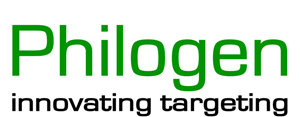Philogen announces publication in Chem (Cell Press) on novel affinity matured OncoFAP ligands isolated from DNA-Encoded Chemical Libraries

Philogen announces publication in Chem (Cell Press) on novel affinity matured OncoFAP ligands isolated from DNA-Encoded Chemical Libraries
The study highlights the application of DNA-Encoded Chemical Libraries (DEL) for the discovery of low picomolar inhibitors of Fibroblast Activation Protein (FAP) for tumor-targeting applications.
The novel OncoFAP ligands show a prolonged residence time in the tumor
Siena (Italy), November 7th 2022 - Philogen S.p.A., a clinical-stage biotechnology company focused on the development of innovative medicines based on tumor targeting antibodies and small molecule ligands, announces the publication of a study in the peer-reviewed journal “Chem” describing the design, development and the in vivo characterization of novel OncoFAP ligands. The study, conducted by scientists at Philochem AG, the wholly-owned Swiss subsidiary company of Philogen, shows how Philochem’s DNA Encoded Chemical Libraries can be applied to generate novel ultra-potent small molecule ligands for tumor targeting applications.
The paper can be accessed on the Cell Press website under the following link.
Fibroblast Activation Protein (FAP) is a tumor-associated antigen that shows abundant and selective expression in the majority of human solid malignancies, with elevated FAP levels associated with worse clinical outcomes. The application of Philochem’s affinity-maturation DNA-encoded chemical libraries (DEL), based on three series of 50,730 propargylglycine derivatives, have enabled the identification of picomolar FAP-inhibitors. This includes, a 177Lu-DOTAGA conjugate of the most potent novel FAP-inhibitor, OncoFAP-11 and its bivalent version, BiOncoFAP-11, which localize to tumors implanted in mice, with enhanced tumor residence time, therefore sparing healthy organs.
Dario Neri, Chief Executive Officer of Philogen commented: “This study highlights the invaluable potential of our DEL discovery platform and its ability to generate ultra-potent ligands against specific proteins associated with certain diseases, including cancer. Using these ligands Philogen is developing OncoFAP binders that have shown very rapid and selective accumulation to tumor lesions. We are truly excited by the potential of OncoFAP and are committed to bringing this treatment modality to the clinic.”
Philogen Group Description
Philogen is an Italian-Swiss company active in the biotechnology sector, specialized in the research and development of pharmaceutical products for the treatment of highly lethal diseases. The Group mainly discovers and develops targeted anticancer drugs, exploiting high-affinity ligands for tumor markers (also called tumor antigens). These ligands - human monoclonal antibodies or small organic molecules - are identified using Antibody Phage Display Libraries and DNA-Encoded Chemical Library technologies.
The Group's main therapeutic strategy for the treatment of these diseases is represented by the so-called tumor targeting. This approach is based on the use of ligands capable of selectively delivering very potent therapeutic active ingredients (such as pro-inflammatory cytokines) to the tumor mass, sparing healthy tissues. Over the years, Philogen has mainly developed monoclonal antibody-based ligands that are specific for antigens expressed in tumor-associated blood vessels, but not expressed in blood vessels associated with healthy tissues. These antigens are usually more abundant and more stable than those expressed directly on the surface of tumor cells. This approach, so called vascular targeting, is used for most of the projects pursued by the Group.
The Group's objective is to generate, develop and market innovative products for the treatment of diseases for which medical science has not yet identified satisfactory therapies. This is achieved by exploiting (i) proprietary technologies for the isolation of ligands that react with antigens present in certain diseases, (ii) experience in the development of products targeted at the tissues affected by the disease, (iii) experience in drug manufacturing and development, and (iv) an extensive portfolio of patents and intellectual property rights.
Although the Group's drugs are primarily oncology applications, the targeting approach is also potentially applicable to other diseases, such as certain chronic inflammatory diseases.
* * *
FOR MORE INFORMATION:
Philogen - Investor Relations
IR@philogen.com - Emanuele Puca | Investor Relations
Consilium Strategic Communications contacts
Mary-Jane Elliott, Davide Salvi, Lucie Foster
Philogen@consilium-comms.com


 Yahoo Finance
Yahoo Finance 
